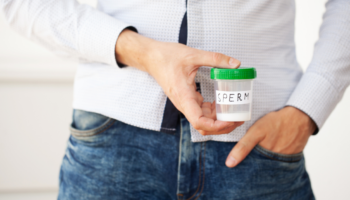It's easy to take sex for granted as a healthy person. For people who have vaginas, it means easy lubrication, pleasure during penetration, no allergic reactions to condoms, lubricants, etc., and generally being able to have sex that is pleasurable and fun.
Imagine if every time you tried to have penetrative sex, you had to stop. The intense pain is like stabbing, burning, or pinching. Once you stop touching your vulva, though, the pain stops. It may also happen when trying to insert a tampon, or during a PAP test.
Vulvodynia Is as Common as Asthma
This condition is called vulvodynia, and it's as common as asthma (7.8% of people in the U.S. have asthma, according to the CDC.) About 8% of people with vaginas will develop primary (from the first time they have sex) or secondary (later in life) vulvodynia.
"Most women will think it's a yeast infection and try to treat their symptoms that way", says Dr. Leslie Sadownik, OBGYN and director of the BC Centre for Vulvar Health. The problem? Yeast infection treatments will only make the pain worse.
Another issue, Dr. Sadownik explains, is that it's difficult to diagnose. "There's nothing to see. There's no objective change to the skin. Many doctors are not familiar with this condition, and without any visual signs, they will not make a diagnosis."
It Can Get Worse with Age
Untreated vulvodynia can get worse with age. It goes from pain from direct genital contact only to pain from activities like cycling or exercising; eventually it's difficult for those people to wear anything close to the skin, like underwear - or even pants. It can develop into something called "burning vulva syndrome," or generalized vulvodynia, where the vulva is intensely painful most of the time. Yikes.
Doctors don't quite know the cause for vulvodynia yet, but there are a few treatment options available. Most of them are related to pain management: medication that reduces the feeling of pain, physiotherapy to learn to control the body's physical reactions to pain and improve pelvic floor strength, and pain management psychotherapy. Some people may be candidates for surgery, but only in a small percentage of cases.
Think You Have Vulvodynia? Get Medical Care
If you think you have vulvodynia, it's really important to seek medical care. Dr. Carolyn Klein, registered psychologist and director of the Multidisciplinary Vulvodynia Program at the B.C. Center for Vulvar Health, explains that a lot of people believe that sex typically hurts, and they don't seek care when experiencing sexual pain.
"Sex should not hurt," Dr. Klein said. "It's not normal. Primary health care providers are not well-trained in vulvar health, but it's not in your head."
She also emphasizes that many people have this condition. "Many women struggle with this condition, and there are treatments out there. Because there are multiple possible causes, there are also multiple treatment plans."
Why don't more people know about this condition? The main culprit: shame and taboo around sexual topics. Since people don't generally like to talk about sex, it can be difficult to realize that feeling pain during sex is so common. Knowing that you are not alone is an important step toward empowerment and asking for accessible sexual health services and treatments.
When it comes to treating vulvodynia, an OBGYN is more likely to be better trained in the condition; if you don't have one, ask to be referred. A healthy sex life is part of a healthy life in general. And, while vulvodynia may be fairly common, painful sex definitely isn't normal.




